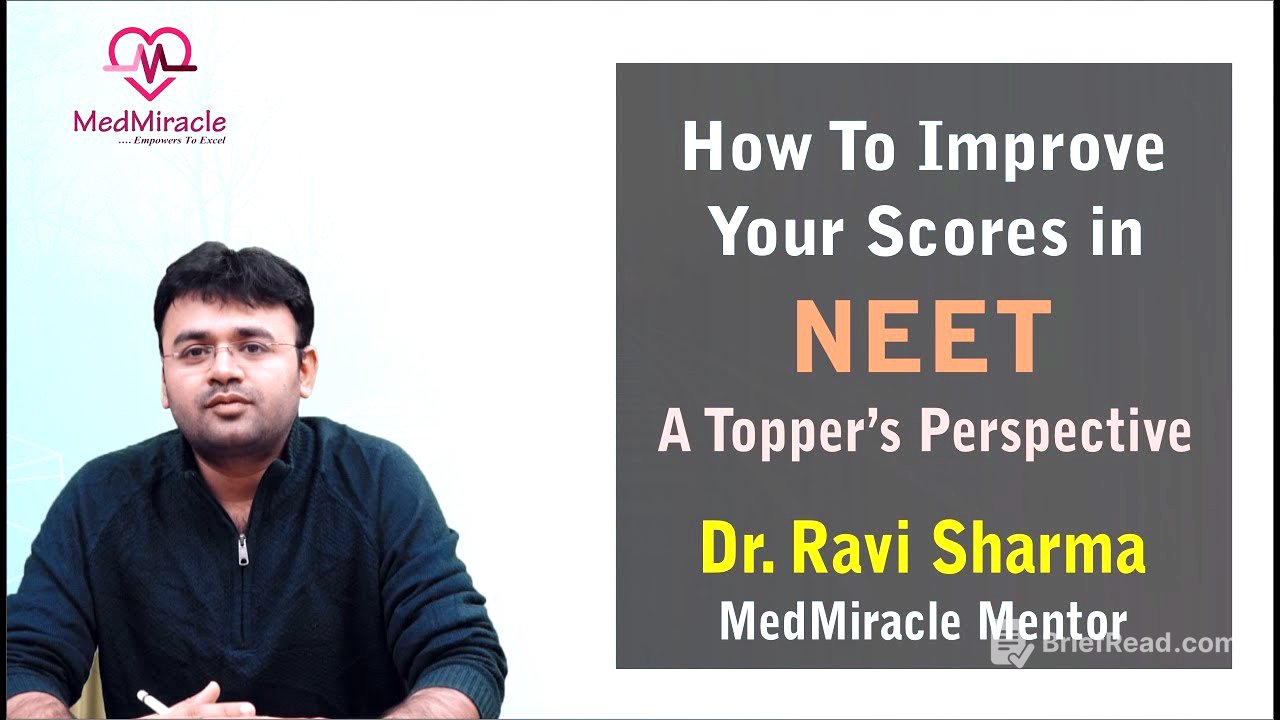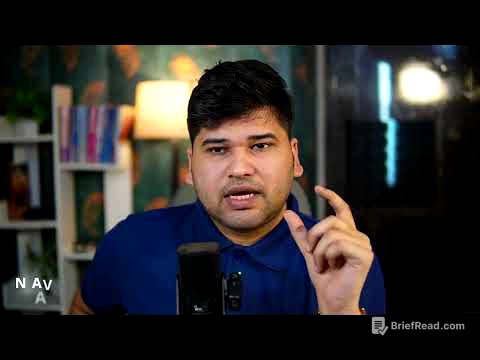TLDR;
This video is about how to approach NEET PG 2019 exam in the remaining 4 months. It emphasizes the importance of confidence, micro-planning, time management, and strategic study. It also addresses common concerns of interns and students facing personal hardships, encouraging them to stay focused and motivated.
- Confidence and self-belief are crucial for success.
- Micro-planning, focusing on daily goals, is more effective than long-term planning.
- Efficient time management, especially utilizing "interstices," can significantly improve preparation.
- Strategic study, tailored to individual needs and exam patterns, is essential.
Introduction: The Importance of Confidence [0:10]
The video starts by outlining the NEET PG 2019 exam format: a computer-based test with 300 questions, negative marking, and likely to be held in the first week of January 2019. With approximately 4 months remaining, the speaker stresses the importance of confidence and self-belief. He shares a story of two mice in a bucket of cream, emphasizing the need to struggle and fight to succeed, rather than giving up. The core message is to believe in yourself and your ability to crack the exam.
Addressing Interns' Concerns: Is it Possible to Crack NEET PG with a Hectic Internship? [2:36]
The speaker addresses a common concern among interns: whether it's realistic to aim for NEET PG with a hectic internship schedule. He argues that it is possible, but it requires a strong intent and a willingness to test your limits. He quotes Superman, "The only way to know how strong you are is to test your limits." Desperation fuels passion, which helps overcome the fear of failure and ultimately leads to success.
Micro-Planning: The Key to Effective Preparation [5:38]
The video introduces the concept of micro-planning, which involves focusing on small, achievable goals rather than overwhelming long-term targets. The speaker advises planning the next day the night before, breaking down the day into hourly slots. Initiating the day right, by waking up early, is crucial for sticking to the plan.
The Concept of Interstices: Maximizing Time Utilization [9:09]
The speaker introduces the concept of "interstices," which refers to the time period between two activities. He emphasizes the importance of utilizing these small pockets of time, such as travel time or breaks during internship, for revision or quick learning. Efficient use of interstices can significantly improve overall preparation, especially for those with hectic schedules.
Focus and Devotion: Giving 100% to Each Task [13:17]
The video stresses the importance of giving 100% focus to each task, regardless of its duration. The speaker quotes Thomas Alva Edison, "When I comb my hair, I only think of my hair," to illustrate the concept of devotion. Avoid distractions and focus solely on the task at hand, whether it's studying or practical work.
Time Management: Studying with a Stopwatch [15:31]
The speaker advises studying with a stopwatch to keep track of time spent on each topic. This helps in identifying areas where you're spending too much time and ensures efficient time allocation. While it may seem tedious initially, it can save a lot of time in the long run.
Leveraging Internship: Practical Application and Doubt Clearing [17:08]
The video encourages utilizing internship to improve practical knowledge and clear doubts. Many exam questions are based on practical scenarios, procedures, and instruments. Don't consider internship a waste of time; instead, use it to enhance your understanding of real-life situations.
Image Collection: Organization and Stratification [18:37]
The speaker emphasizes the importance of collecting and organizing images for image-based questions. He suggests creating folders and labeling images based on specific topics or subjects. This makes it easier to revise and recall images during the exam. He shares an example from his own phone, demonstrating how he stratifies neurosurgery images.
Summarization and Long-Term Potentiation of Memory [22:41]
The video highlights the importance of summarizing what you've read before going to sleep. This helps in long-term potentiation of memory. Memory works on the principle of submission, where thoughts are revisited at fixed intervals. Revising before sleep helps in recalling information during the exam.
Summary of Micro-Planning Approach [24:25]
The speaker summarizes the micro-planning approach: plan the next day tonight, wake up early, use daily interstices, take one day at a time, give 100% focus to each task, study with a stopwatch, leverage your duty hours, keep image-based questions organized, and revise before sleep.
Selective Strategy: Topic-Based Approach for Those Who Haven't Finished Syllabus [25:33]
The video divides the approach into two categories: those who have finished the syllabus once and those who haven't. For those who haven't finished, the speaker suggests a topic-based approach, focusing only on important topics. He advises analyzing the last 5 years' question papers to identify frequently asked topics.
Integrated Study and Pattern Recognition [29:56]
The speaker suggests integrating one subject with another, such as studying renal physiology, pathology, and pharmacology together. Pattern recognition of individual exams is crucial for selective study. It's important to understand what needs to be read, rather than just cramming repeats.
Grand Tests: Pacing and Familiarization [31:31]
The video advises against giving too many grand tests. Grand tests are primarily for pacing and familiarization with the exam format, not for accurate evaluation of rank. One grand test a month is sufficient. Don't get disheartened or overconfident based on grand test results.
Role of Social Media: Sensible Usage and Avoiding Controversies [34:07]
The speaker advises sensible usage of social media. Follow only one or two groups and avoid wasting time on controversial questions. It's better to accept one answer for yourself rather than spending too much time proving others wrong.
Subject Prioritization and Exam Strategy [35:40]
The video suggests starting with the subject you know the least, followed by subjects with maximum weightage in the exam. All 19 subjects are important. The speaker also advises giving AIIMS and PGI exams, even if you're primarily preparing for NEET, as it provides valuable experience and exposure to new questions.
Group Study vs. Self Study [38:06]
The speaker discusses the merits of group study versus self-study. He advocates group study for rote learning subjects like forensic medicine and microbiology.
Revision Strategy for Those Who Have Finished Syllabus [38:42]
For those who have already finished the syllabus, the key is revision. Revise your notes, MCQ books, and handmade notes at least three times in the next four months. A 60-day schedule with multiple revisions is ideal.
AIMS and PGI Exams for Revision Group [40:24]
The speaker advises this group to give AIIMS and PGI exams for real-life evaluation and stress management. Do not read anything new, just revise, revise, and revise.
Addressing Students Facing Hardships: Don't Let Misfortune Control Your Destiny [41:53]
The video concludes by addressing students facing personal hardships, such as those affected by the Kerala floods. The speaker encourages them not to lose hope or focus. He quotes a famous line from "The Secret": "You may be facing one of the toughest times of your life at this moment, but what is to follow could be the greatest gift you ever received." He emphasizes that performance and success can bring happiness to both the individual and their family.









